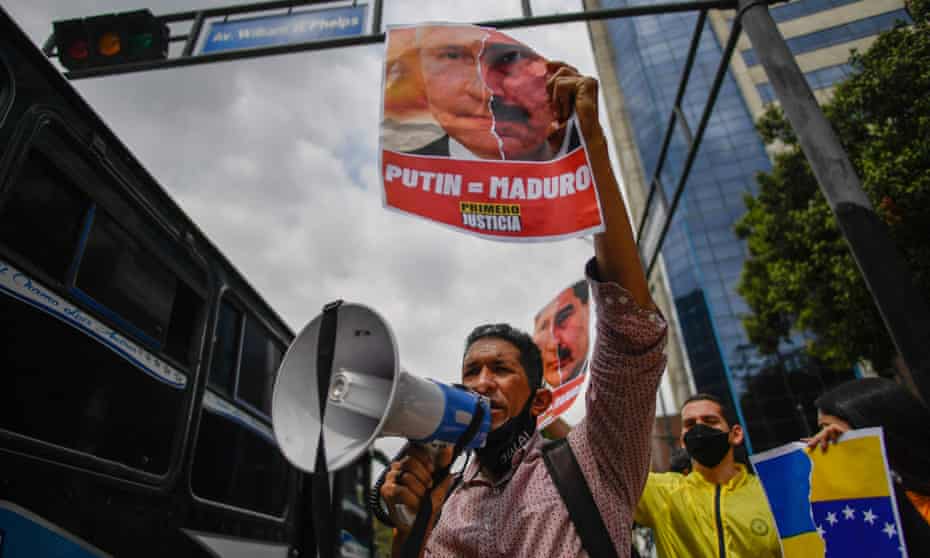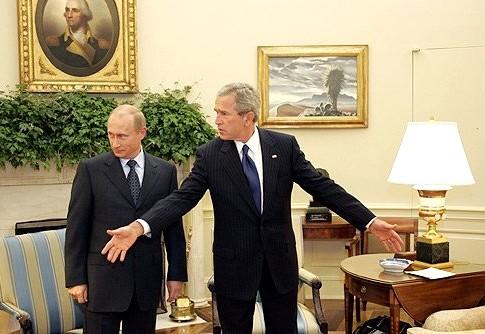US officials fly to Venezuela for talks in apparent bid to further isolate Russia
Experts believe rare meeting with Moscow ally could signal significant shift in US policy towards Caracas

Senior US officials have flown to Venezuela for rare talks with Nicolás Maduro’s government in an apparent bid to prise the South American country away from its Russian backers after Vladimir Putin’s invasion of Ukraine.
White House and state department negotiators met Maduro representatives in Venezuela’s capital, Caracas, on Saturday in what was the first such encounter in years.
Citing anonymous US officials, the New York Times claimed the Biden administration was motivated partly by concern that Russia’s Latin American allies – which include the authoritarian regimes in Cuba, Nicaragua and Venezuela – could become “security threats” if the geopolitical clash with Putin escalated.
Others speculated that the US saw Venezuelan oil as a potential substitute for Russian imports were it to slap sanctions on Moscow as a result of Putin’s invasion of Ukraine. Venezuela has the world’s largest oil reserves and its output is currently growing despite US sanctions imposed at the height of the 2019 attempt to topple Maduro.
Reuters said no agreement was reached at Saturday’s talks. However, some experts believe the encounter could signal a significant shift in US policy towards the crisis-stricken South American country, which has been plunged into humanitarian and political crisis since Maduro took power in 2013.
Christopher Sabatini, a senior fellow for Latin America at Chatham House, said the US’s precise objectives were unclear although damaging Russian interests and multi-billion dollar investments in Venezuela was likely high on the list.
“Clearly, they want to really try to blunt Russia’s influence in the hemisphere. They don’t want any projections of power,” Sabatini said, adding: “This is also an opportunity to get the US private sector back into Venezuela and squeeze out the Russians.”
The US cut diplomatic ties with Maduro in 2019 as Donald Trump’s White House backed an ultimately unsuccessful push to drive him from power by recognising a young opposition politician, Juan Guaidó, as president and attempting to provoke a military uprising.
Maduro clung to power in large part thanks to continued economic support from China, Iran and Russia.
Recent months have seen growing hints that the US is changing tack on Venezuela under Biden, although officials insist there will be no sudden lifting of sanctions they say are intended to help restore Venezuelan democracy.
In an interview with the Americas Quarterly podcast last week, Biden’s top adviser on Latin America, Juan Gonzalez, said the US would continue to recognise Guaidó as Venezuela’s rightful leader. However, Gonzalez left no doubt the new administration had ditched the Trump era effort to overthrow Maduro.
“Whereas the previous administration’s theory of change was based on regime collapse, ours is more on the need to recognise that only a negotiation will lead to concrete and sustainable change in Venezuela towards democratic order,” Gonzalez said.
Revealingly, even influential conservative voices who once championed Maduro’s downfall are changing their tune. “We need to rethink everything right now –including not allowing Russia to cozy up to countries near us!” the former Fox Business presenter Trish Regan tweeted on Sunday.
Regan added: “It’s not just US officials meeting in Venezuela right now – it’s also key executives from MAJOR US oil companies, including Chevron. This is real, folks. If agreements are reached, we will replace Putin’s oil with massive reserves from Orinoco region of Venezuela.”
Sabatini said the risk of US efforts to remake its relations with Maduro’s Venezuela was that issues such as human rights and democracy “could get squeezed in the name of realpolitik”.
“That would be tragic given the situation in Venezuela … So it’s going to be a delicate diplomatic balance.”
Thank you for joining us from Germany.
The truth, they say, is the first casualty of war, more so at a time when misinformation spreads so rapidly. But with correspondents on the ground on both sides of the Ukraine-Russia border, in Kyiv, Moscow, Brussels and other European capitals, the Guardian is well placed to provide the honest, factual reporting that readers will need to understand this perilous moment for Europe, the former Soviet Union and the entire world.
The Guardian has an illustrious history of persistent, independent reporting in the region. We know there is no substitute for being there, and were on the ground at all the critical moments - from the 1917 revolution and the Ukrainian famine of the 1930s, to the collapse of 1991 and the first Russo-Ukrainian conflict in 2014. And we will stay on the ground through this frightening period as well.
Tens of millions have placed their trust in the Guardian’s fearless journalism since we started publishing 200 years ago, turning to us in moments of crisis, uncertainty, solidarity and hope. We’d like to invite you to join more than 1.5 million supporters, from 180 countries, who now power us financially – keeping us open to all, and fiercely independent.
Unlike many others, the Guardian has no shareholders and no billionaire owner. Just the determination and passion to deliver high-impact global reporting, always free from commercial or political influence. Reporting like this is vital for democracy, for fairness and to demand better from the powerful.
And we provide all this for free, for everyone to read. We do this because we believe in information equality. Greater numbers of people can keep track of the global events shaping our world, understand their impact on people and communities, and become inspired to take meaningful action. Millions can benefit from open access to quality, truthful news, regardless of their ability to pay for it.
If there were ever a time to join us, it is now. Every contribution, however big or small, powers our journalism and sustains our future. Support the Guardian from as little as €1 – it only takes a minute. If you can, please consider supporting us with a regular amount each month. Thank you


Keine Kommentare:
Kommentar veröffentlichen